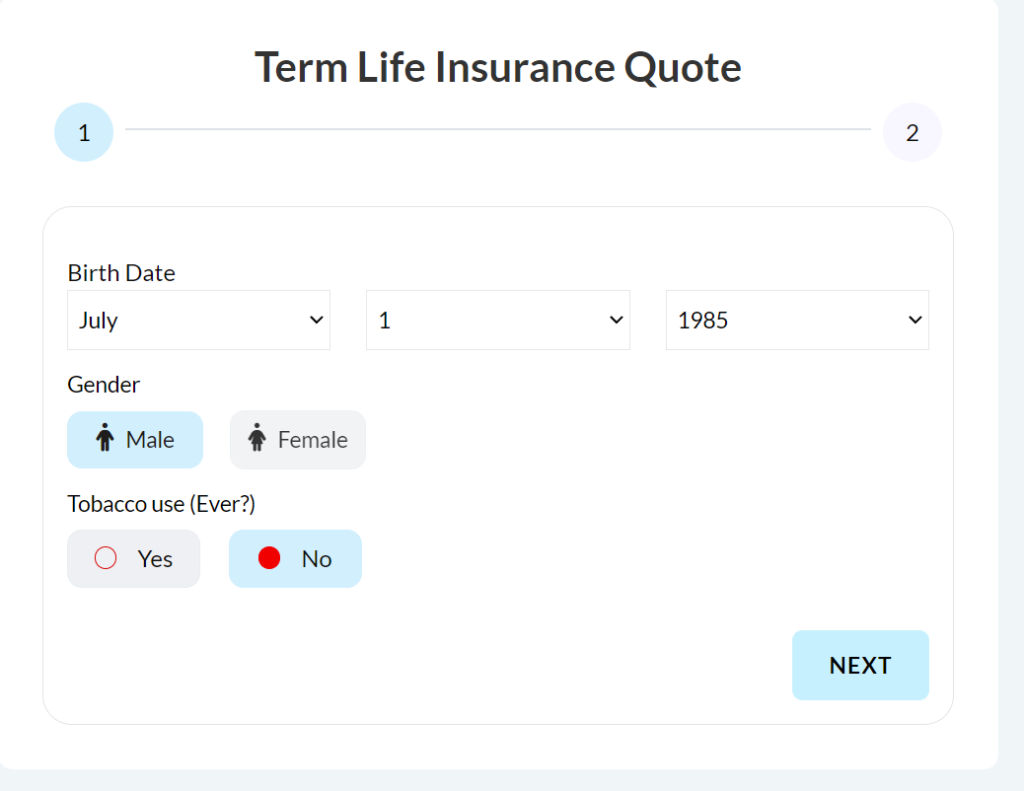- Connect with our licensed Canadian insurance advisors
- Shedule a Call
BASICS
COMMON INQUIRIES
- Can I Have Both Short-Term and Long-Term Disability Insurance?
- Should Both Husband and Wife Get Term Life Insurance?
- Can I Change Beneficiaries on My Canadian Term Life Policy?
- What Does Term Life Insurance Cover and Not Cover?
- Does Term Insurance Cover Death?
- What are the advantages of Short-Term Life Insurance?
- Which Is Better, Whole Life Or Term Life Insurance?
- Do Term Life Insurance Rates Go Up?
- Is Term Insurance Better Than a Money Back Policy?
- What’s the Longest Term Life Insurance You Can Get?
- Which is better, Short-Term or Long-Term Insurance? Making the Right Choice
IN THIS ARTICLE
- What is the minimum income for Term Insurance?
- How Does Income Affect Your Term Life Insurance Policy?
- Can You Buy Term Life Insurance Online with a Low Income?
- How Can You Lower Your Term Life Insurance Cost?
- How Much Term Life Insurance Do You Need?
- Can Your Term Life Insurance Policy Be Adjusted Over Time?
- Why Term Life Insurance Is Ideal for Lower-Income Canadians
- Final Thoughts
- More on Term Life Insurance
More Canadians Relying on Family Support to Achieve Homeownership in 2025


By Harpreet Puri
CEO & Founder
- 10 min read
- April 24th, 2025
SUMMARY
In 2025, more Canadians, especially younger buyers, are relying on family support like inheritances, gifts, or loans to achieve homeownership, as housing affordability declines. A Statistics Canada report shows 40% of homeowners received family help, revealing rising inequality and dependence on intergenerational wealth. The trend raises concerns over limited access to housing for those without family support and calls for policy reforms to address the growing divide.
INTRODUCTION
A growing number of Canadians are relying on family support, by way of inheritances, financial gifts, or loans, to buy a home, Statistics Canada said in a recent article based on the 2023 Survey of Financial Security data. With housing affordability declining, in particular, for younger generations, support from family members has emerged as an essential springboard into the real estate market.
Homeownership Still the Cornerstone of Wealth in Canada
The study, called Familial Support in Entering the Canadian Housing Market, highlights the importance of homeownership for long-term financial stability. Real estate equity accounted for 42 per cent of total household wealth across Canada in 2023, reflecting how intertwined homeownership is with the creation and retention of wealth.
The positive effects of homeownership extend far beyond individual wealth. Those born in the 1990s were more than twice as likely to own a home if their parents were homeowners, the report said. Even more striking was the fact that children whose parents own multiple properties were close to three times as likely to become a homeowner themselves. This pattern points to how intergenerational wealth and asset transfer increasingly shape access to homeownership.
The researchers also found that homeowners tended to have higher financial resiliency scores, which means that they are more prepared to absorb economic shocks — another benefit of inherited wealth.
Inheritances Fill the Housing Affordability Gap
As affordability crumbles, inheritances are increasingly filling the financial gap for homebuyers. In 2019, roughly 30% of homeowners said they received an inheritance, with a median value of $67,000. In 2023, that number jumped to $85,100 — a staggering increase that speaks to not just the rising cost of housing but also the increasing reliance on inherited wealth to own a home.
Across all age groups:
- Five percent of families said they lived in homes purchased at least in part through a gift or inheritance.
- 9% of homeowners reported that part of their down payment came from a gift or inheritance.
When factoring in all types of family support—including borrowing from family and friends rather than traditional lenders—the total number of homeowners who received family assistance was 40% or 4 in 10 homeowners.
Young Canadians Depend on Family Support the Most
That reliance is even more salient among those under the age of 35. These younger buyers were more than twice as likely to report using gifted money to fund their home downpayment as older age groups were. This stat illustrates quite vividly: for many young Canadians, breaking into the housing market without assistance from family is becoming an increasingly daunting task.
The report cautioned against the social and economic implications this change could bring. “Delayed or inaccessible entry into the housing market for those lacking familial support may increase inequality,” it says. And as intergenerational transfers are a key determinant of homeownership, the potential for upward socioeconomic mobility could atrophy for those with less money.
A Widening Wealth Divide
The report suggests worry over the possible long-term implications of increasing reliance on inherited wealth. As owning property becomes ever more dependent on inheritance or support from parents, those without either path may find themselves on a permanent back foot as they seek to make their way through life.
This might further compound economic inequity, particularly for marginalized and lower-income communities without access to intergenerational wealth. The trend of real estate remaining inaccessible for Canadians without family support will continue without meaningful affordability solutions or intervention.
Policy Implications
The data will further fuel the ongoing debates around Canada’s housing policies. While some are calling for an increase in supply and broader mortgage programs, others emphasize the need for tax adjustments or rules that will address the inequities linked to generational wealth.
What housing experts and policymakers might have to think about:
- It could include things like increasing affordable housing and first-time buyer programs.
- Gifted downpayment rules and how they affect market competition
- Reduction in the dependency on microfinancing, family loans, etc., as people get more financially literate about home ownership.
Final Thoughts
The Canadian housing market remains one of the biggest wealth generators in the country, for those who can get their foot in the door. But with home prices climbing and wages lagging, the possibility of home ownership is becoming less a personal achievement and more of a family-enabling milestone. In this changing landscape, policymakers should respond thoughtfully to ensure access to housing — and the financial security that comes with it — is not reserved for people with inherited advantages.
And as the Statistics Canada report makes clear, offers of family help are no longer merely helpful — but rather essential. For many Canadians — especially younger generations — owning a home may increasingly not depend only on what they earn, but on what their families can give.

Sources and Further Reading
- Familial Support in Entering the Canadian Housing Market
This article presents recent findings from the 2023 Survey of Financial Security, highlighting the level of familial support many young homeowners have received when entering the housing market.
Read the full article - Survey of Financial Security, 2023
Provides detailed insights into the assets, debts, and net worth of Canadian families, emphasizing the role of homeownership in wealth accumulation.
Access the reportStatistics Canada+2Statistics Canada+2Statistics Canada+2 - Parents and Children in the Canadian Housing Market
Examines the relationship between parental homeownership and the likelihood of their children owning homes, focusing on those born in the 1990s.
Explore the studyStatistics Canada - Parents’ Housing Wealth and Adult Children’s Property Values
Investigates how the housing wealth of parents influences the property values owned by their adult children.
Read the analysisStatistics Canada+5Statistics Canada+5Statistics Canada+5 - Housing, Wealth, and Debt: How Are Young Canadians Adapting?
Discusses the financial challenges faced by young Canadians, including the impact of rising housing costs and the strategies they employ to adapt.
View the reportStatistics Canada+2Statistics Canada+2Statistics Canada+2 - The Assets, Debts, and Net Worth of Canadian Families, 2023
Provides a comprehensive overview of the financial standing of Canadian families, highlighting disparities across different demographics.
Access the publicationStatistics Canada - Housing Statistics Portal
A centralized hub for various housing-related data and analyses provided by Statistics Canada.
Visit the portalStatistics Canada+8Statistics Canada+8Statistics Canada+8
Key Takeaways
- Homeownership remains a major source of wealth in Canada
As of 2023, real estate equity accounted for 42% of total household wealth, making homeownership one of the most critical tools for financial security and generational wealth building. - Family support is increasingly essential to buy a home
A growing number of Canadians—especially younger generations—are relying on gifts, inheritances, or family loans to afford down payments or even entire properties. - Intergenerational wealth impacts homeownership opportunities
Canadians born in the 1990s are twice as likely to become homeowners if their parents owned property, and three times as likely if their parents owned multiple homes. - Inheritances are playing a larger role in home financing
The median inheritance received by homeowners rose from $67,000 in 2019 to $85,100 in 2023, highlighting its growing importance in closing the affordability gap. - 40% of homeowners have benefited from familial support
This includes direct gifts, inheritances, or informal loans from family and friends, demonstrating a major shift in how Canadians are entering the housing market. - Younger Canadians (under 35) are the most reliant on family gifts
This age group is twice as likely to use gifted funds for their down payment compared to other demographics, underlining their growing dependence on family wealth. - Inequality may deepen without policy changes. As access to homeownership becomes more dependent on family financial support, socioeconomic mobility may be hindered, especially for those without inherited wealth.
Your Feedback Is Very Important To Us
We’re gathering insights to understand better what challenges individuals and businesses face when trying to determine if Term Life Insurance can be claimed as a business expense. Your feedback will help us improve our educational content and resources.
IN THIS ARTICLE
Sign-in to CanadianLIC
Verify OTP

